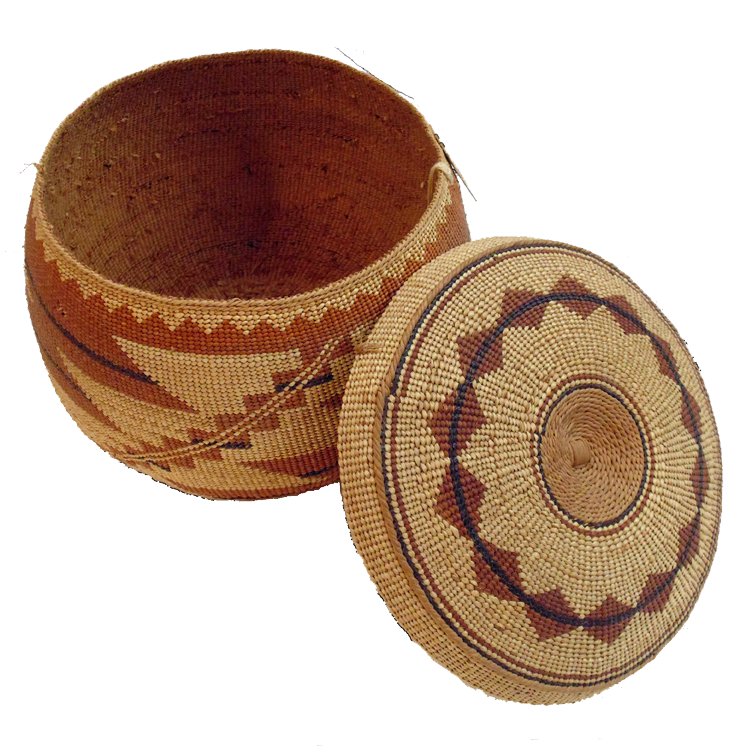sípnuuk • N • storage basket
The mission of the Sípnuuk Digital Library, Archives and Museum (Sípnuuk) is to manage, share and enhance understanding of Karuk history, language, traditions, natural resource management and living culture following the cultural protocols of the Karuk Tribe and in support of the missions of the Karuk Tribe, Department of Natural Resources, People’s Center and Karuk Tribal Libraries, Archives and Museums.
Collection Scope
Geographic areas (listed in order of priority)
- Karuk Ancestral Territory
- Klamath Basin, with an emphasis on tribal territories
- Areas identified to have relevant environmental and/or socio-political and/or cultural characteristics to the Klamath Basin.
Subject Areas
Native foods and fibers, cultural practices related to the management of natural resources, the traditional knowledge and skills of Native people, Karuk language and culture.
Formats
Sípnuuk is a repository and program for born-digital, digitized, and to-be-digitized content. This includes images (prints, negatives, slides, and digital images), movies (original film or video transfers to digital video format), audio (cassette tapes, CDs or other recordings transferred to digital audio format), and documents (physical, printed documents scanned or word processing documents converted to PDF). Best practices for enduring file formats will be utilized.
Languages
English, Karuk, and other Klamath Basin tribal languages will be prioritized. Works in languages besides those listed here will not be collected unless an English translation of them is not available. Foreign language duplicates of items available in English will not be collected.
Collections Context
Background
Traditional Karuk cultural information systems, based on oral traditions, were disrupted as a result of Euro American contact in Karuk Ancestral Territory. While the impact on these systems has been ongoing from genocide, warfare, federal and state Indian policies and legislation (including forced assimilation initiatives) and have suffered dramatically as a result, Karuk oral traditions persist. A wealth of traditional knowledge continues to be passed down through Karuk families and networks according to Karuk cultural protocols that inform what information is made available to whom and when.
Information relevant to Karuk culture and people has also been documented by non-native authors and data collectors since Euro American contact, including government agencies implementing policies and academic researchers attempting to document Karuk culture through ethnography and related fields. Information relevant to Karuk people and culture continues to be generated today in many forms, by both Native and non-native peoples. However, this information is managed according to western cultural protocols informed by open access principles and copyright laws. Under these systems, much information relevant to the Karuk Tribe has been publicly distributed that is incorrect, unethically (and sometimes illegally) gathered, and/or inappropriate for public audiences. Moreover, researchers, along with their academic institutions, are also commonly granted copyright to traditional knowledge at the expense of the individuals and communities providing that knowledge.
As a part of our efforts to revitalize Karuk culture and fully realize tribal sovereignty, the Karuk Tribe is developing infrastructure and human resources to further gain managerial oversight and legal custody of our own cultural information to the greatest extent possible. Proactive acquisitions of collections owned by external entities, and processing collections already owned by the Karuk Tribe are important, due to real risks of continued information loss. Efforts will be made to repatriate or gain custody of originals or duplications of originals that are owned by other entities, and to request that other entities honor Karuk cultural protocols in their management of Karuk cultural information. Efforts have been and will continue to be made to develop and refine policy to educate researchers and institutions about appropriate uses and access to Karuk cultural information
Methods of Collecting
Selections
Sípnuuk has a broad scope outlined in the mission statement above. It will be built incrementally, as funding is available, utilizing a common planning process to guide and streamline implementation whenever possible (see Sípnuuk Digital Library Project Planning Worksheet). It is anticipated that Tribal programs and departments will propose program areas and seek funding therefore, working in collaboration with Karuk Tribal Libraries and Sípnuuk staff and leadership.
Donations
All donations must fit the scope of Sípnuuk. Legal title of records donated will be conveyed by the Sípnuuk Digital Library, Archives and Museum Deed of Gift. Donated materials will be reviewed by library staff who will determine what materials will be added to the collection. Sípnuuk reserves the rights to decline an offer of material that is already held in the collection or that does not meet collection needs, and to discard donated materials that are not selected for the collection.
Priorities for Collecting
Priority will be given to materials and content at risk of loss with high value to enduring Karuk cultural memory, as well as materials within the scope that become available by ease of opportunity.
Access
Intellectual Property and Take-Down Guidelines
Any materials containing Karuk traditional knowledge are the intellectual and cultural property of the Karuk People, and we will therefore make these materials available according to our Karuk cultural protocols regardless of their current copyright assignment. In any case, the Karuk Tribe asserts primary ownership of all cultural knowledge specific to our Tribe. Parties who have questions or who wish to contest the use of specific works may contact:
Karuk Historic Preservation Officer
Karuk Tribe Department of Natural Resources
PO Box 282
Orleans, CA 95556
Sustainability
Digital Preservation
Sípnuuk will apply best practices for data management and digital preservation for all deposited content. Sipnuuk will apply Karuk community governance principles and Karuk cultural protocols to uphold knowledge and data sovereignty.
Authors
Sípnuuk Advisory Committee
Date: 12-04-2014, Edited 05/15/2025
